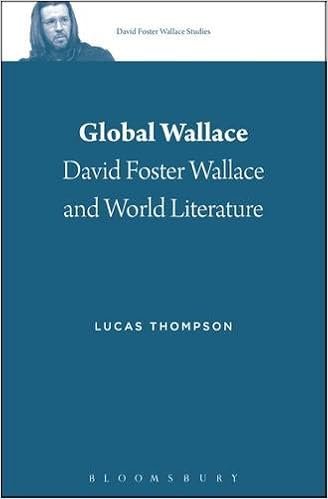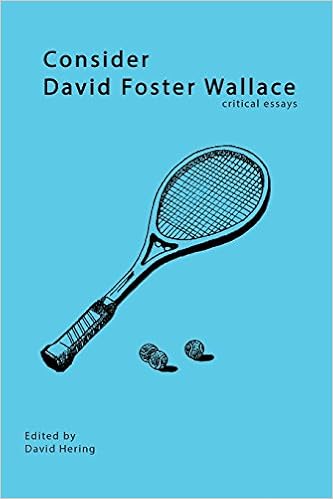There were a couple of Wallace related posts back on World Mental Health Day (Oct 10):
Last Updated on Tuesday, 18 October 2016 23:26
Yet another Wallace publication from Wallace studies powerhouse, Bloomsbury. Yet another one to look forward to!

Due on the 1st of December is Lucas Thompson's, Global Wallace: David Foster Wallace and World Literature (also via Amazon).
From the Bloomsbury site (where you can view the TOC too):
David Foster Wallace is invariably seen as an emphatically American figure. Lucas Thompson challenges this consensus, arguing that Wallace's investments in various international literary traditions are central to both his artistic practice and his critique of US culture. Thompson shows how, time and again, Wallace's fiction draws on a diverse range of global texts, appropriating various forms of world literature in the attempt to craft fiction that critiques US culture from oblique and unexpected vantage points.
Using a wide range of comparative case studies, and drawing on extensive archival research, Global Wallace reveals David Foster Wallace's substantial debts to such unexpected figures as Jamaica Kincaid, Julio Cortázar, Jean Rhys, Octavio Paz, Leo Tolstoy, Zbigniew Herbert, and Albert Camus, among many others. It also offers a more comprehensive account of the key influences that Wallace scholars have already perceived, such as Fyodor Dostoevsky, Franz Kafka, and Manuel Puig. By reassessing Wallace's body of work in relation to five broadly construed geographic territories -- Latin America, Russia, Eastern Europe, France, and Africa -- the book reveals the mechanisms with which Wallace played particular literary traditions off one another, showing how he appropriated vastly different global texts within his own fiction. By expanding the geographic coordinates of Wallace's work in this way, Global Wallacereconceptualizes contemporary American fiction, as being embedded within a global exchange of texts and ideas.
Some more pics via @HouseofNaqvi over on Twitter.

Two more fantastic episodes have dropped since my last update:
Episode 18's guest on The Great Concavity is Sean Pratt (@SPPresents) the narrator of the 56-hour-long audiobook of Infinite Jest. It's an absolutely engrossing conversation about the recording of the audiobook and many other things. And yes, I did say I couldn't recommend the audiobook without endnotes. And yep, I understand there were technological issues at the time. And, yes, I think Sean makes a good case for why the end notes were not originally recorded and a .pdf was included (but as a podcast and audiobook listener while cycling or driving the reading pdf option seemed flawed), and, like mentioned in the podcast, I still wonder why each end note isn't a skippable track so the listener can decide to skip them if they wish...
But you know what? In all my negativity I never actually acknowledged how much hard work went in to making it, and I NEVER gave Sean credit for the incredible job he did narrating the novel.
Thank you, Sean.
(I think a little more credit than is due was sent my way too... but that's another story.)
Episode 19 has two guests, Rachel Laird & Amy Pelletier, who speak with Dave about reading Infinite Jest for the first time. I know I'm not the only one who pulled one of my copies of Infinite Jest back off the shelf after listening to this episode...
(Follow the show on twitter @ConcavityShow and subscribe to the podcast here)
---
The podcast is hosted by Dave Laird (@DaveLaird2) and Matt Bucher (@mattbucher,wallace-l, MattBucher.com, Simple Ranger, Side Show Media Group) two Wallace enthusiasts with a wealth of Wallace knowledge to share.
Last Updated on Tuesday, 18 October 2016 23:04
Oh, wow.
If you want a taste for how impressive David Hering's book, David Foster Wallace: Fiction +Form, is going to be then check out the excerpt of the chapter about The Pale King, Too Much Too Little, in the LA Review of Books.
I can't even decide what to quote to try and get you to read it because it's all so awesome. Hmm. How about this? (Emphasis mine)
[...]
This note clearly represents a crisis point in the life of The Pale King, exacerbated by the fact that a number of sections earmarked for the novel had been published in the short story collection Oblivion the previous year, leaving Wallace with less workable material from which to draw. In the period immediately following, Wallace devised a new narrative strategy to bring the disparate drafts together: he wrote himself into the novel.
[...]
Fiction + Form is available now at Amazon or 30% off in the Bloomsbury back to Uni sale now.

[Previously: Oh and be sure to listen to The Great Concavity podcast epidside starring David Hering too!)
Last Updated on Friday, 16 September 2016 19:42
.
(So I really struggle with doing this every year but I can't not do this. Classic double bind.)
[External memorial posts below here later]
Last Updated on Tuesday, 13 September 2016 00:10
|

(Image via NYT by Jillian Tamaki)
Alan Moore's 'By the Book' interview in the New York Times Review of Books reveals that he has incredible respect for Infinite Jest; a book he's only just recently read:
[...]
After thinking about this long and hard, the last truly great book I read would have to be “Infinite Jest,” by David Foster Wallace. Yeah, sorry. This was my first exposure to Wallace’s work, only a month or two ago, and I don’t think there’s anything about the novel that doesn’t impress me: its stream of satirical invention, with conventional dating gone in favor of a subsidized calendar and the Year of the Depend Adult Undergarment; its mandarin prose that perfectly conjures the trancelike drift of a modern consciousness overwhelmed by detail; and its breathtaking risks with structure, so that the whole experience seems to pivot upon a climactic resolving chapter — either right at the end of the narrative or right at the beginning — which does not actually exist and which therefore requires the reader to create it herself, from slender inference. I think the moment I probably fell in love with Wallace as a writer was the point where I realized that I was actually meant to be irritated by all of the occasionally crucial footnotes. An author after my own heart, and a genuine modern American diamond in the tradition of Thomas Pynchon, Robert Coover and Gilbert Sorrentino.
[...]
There are more references to Wallace in the interview, check it out here.
Last Updated on Friday, 09 September 2016 15:00
|
|








